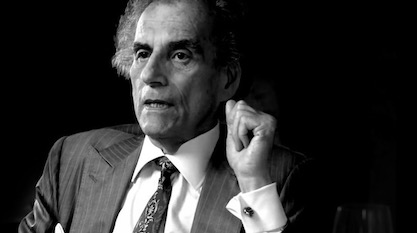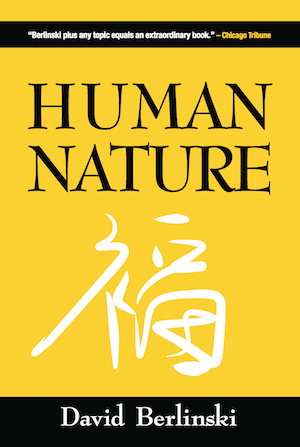 Evolution
Evolution
Human Nature — New Book from David Berlinski Skewers Illusion of Evolutionary Progress in History

This past April 15, the Cathedral of Notre Dame caught fire, devastating not only the physical structure itself but the hearts of Parisians and of other sensitive people, of all faiths or of none, around the world. Terrorism was naturally suspected but the cause turned out to be accidental — human incompetence, or you might say human nature. The next day, just before noon, I received an email from David Berlinski with a short note recounting his experience and offering me permission to publish it at Evolution News, which I promptly and gratefully did.
Berlinski, mathematician, philosopher, brilliant writer, Darwin skeptic, and incomparable character-and-a-half, lives just behind Notre Dame on rue Chanoinesse. In 283 words, he evoked not only the spirit of Paris or Notre Dame, but I think implicitly the understanding of history and man’s place in it sketched in Dr. Berlinski’s new book, Human Nature, which is published today.
The Shadow of Notre Dame
In the wake of the catastrophe of the night before, Berlinski recalled his own past:
My father played on the cathedral’s organ, and after his concert, when the cathedral was deserted, he played Bach’s Passacaglia and Fugue in C minor for my wife and me, the sound booming. In winter, when there were few tourists, I would go into the cathedral and light a candle for M.-P. Schützenberger. He had wished to return as one of the gargoyles, and, perhaps, he had. No building has ever been more a part of my life. I saw the spire topple, slowly at first, and then quickly. The police forced me to evacuate to the other side of the Seine. All of Paris was there. I thought of myself as a Parisian, if not by birth, then, at least, by sentiment.
There you have it. The self-described “secular Jew” living in the shadow of Notre Dame — “I could touch the cathedral walls” — recounts listening to his father play Bach on the cathedral organ, and pays tribute to his friend, mathematician Marco Schützenberger, another Darwin skeptic, by lighting a candle in the ancient cathedral. He witnesses the proud spire fall, first in slow motion, then all at once. The piece appears in a modified form as the Introduction to Human Nature, minus the specific reference to Bach (why?).
Reverence and skepticism are a beautiful match. I listened to a recording of the Passacaglia and Fugue in C minor, played on the great Notre Dame organ by “organist-titular” Philippe Lefebvre, and it struck me that nothing better captures the voices of David Berlinski in this book, weaving together the somber, the ironic, and the hilarious.
The Whig View of History

In Human Nature, Berlinski takes aim at the standard narrative of history in our secular culture, the fatuous Whig view that sees human life and human nature on an upward-inclining plane, evolving toward ever greater, even god-like enlightenment. In this telling, represented by the likes of Steven Pinker and Yuval Harari, an accomplishment like the Cathedral of Notre Dame is just part of the dark, regrettable past, which modern, secular men are in the process of transcending. What is medieval, they would have us believe, is embarrassing, whereas modernity, with its keystone of Darwinian materialism, means peace, contentment, true understanding. Berlinski’s wiser perspective sees things differently. He offers respect to the distant past, touches its walls, listens to its music, and confronts the Pinkers and Hararis with the ultimate rebuke: the squalid 20th century.
Discovery Institute Press chose today as the appropriate occasion to publish Human Nature. November 11, Veterans Day in the United States or Armistice Day in France, recalls the end of World War I, in 1918. As Berlinski reminds us, the 20th century with its triumphant parade of charnel horrors, began with World War I, its origins lying in an epic pileup of human incompetence. So, modern secular man is wiser, better, more peaceful than his ancestors? His nature is getting better all the time? As Berlinksi might ask:
“Really? Is it really?”
Two hundred and thirty-one million men, women, and children died violently in the twentieth century, shot over open pits, murdered in secret police cellars, asphyxiated in Nazi gas ovens, worked to death in Arctic mines or timber camps, the victims of deliberately contrived famines or lunatic industrial experiments, whole populations ravaged by alien armies, bombed to smithereens or sent to wander in their exiled millions across all the violated borders of Europe and Asia.
Berlinski schools Pinker, the famed Harvard cognitive psychologist, on the relevant math, reminding him that “poorly defined problems very often lead to absurd solutions.” While this may make it sound like Berlinski is offering here just an extended reply to Pinker’s book The Better Angels of Our Nature: Why Violence Has Declined, that’s not true. It is impossible to adequately summarize the essays in Human Nature, other than to say it is suffused with scientific and humane learning, with humor, with sharp censure — unlike Phil Johnson, Berlinski doesn’t suffer fools gladly — with personalities, and with a sense of place. The places include Prague, Vienna, but above all Paris.
Did I mention that the house in which Abélard and Héloïse consummated their affair was a few steps from my own apartment?
Or that nothing remains of the original medieval structure but a few interior beams?
I think I did.
There is an interview with Berlinski conducted by Le Figaro — reproduced here in French not, God forbid, in English — as well as an interview I did with David back in 2009. I asked him about his childhood, whether he was always subversive, and he toyed with what was probably a silly question.
I am not sure that I would care to think of myself as subversive. It is a mole-and-badger kind of word, isn’t it? So long as we are searching for similes, I would prefer lion-like. Regal is another fine word.
Not a Declinist, but a Realist
This makes me smile, as Berlinski often does. Of course, he is both lion-like and terribly regal. I asked him how he came to doubt the standard evolutionary story, and he noted that the friend who introduced him to Darwin-skepticism, his Princeton graduate school roommate Daniel Gallin, was no longer a friend, going back (at the time) thirty years. I should have asked why. David concluded our interview with what sounded like a melancholy recognition:
I seem to have separated from the friends I made and I’ve not made new ones. I am by temperament solitary, like the mole or the badger, now that I come to think of it, the Old Mole of Rue Chanoinesse.
Reviewing the septic pageant of the last century, reflecting on its meaning, Human Nature is a sobering work. Berlinski isn’t a Spengler-esque declinist, but more a realist, recognizing the illusion of evolutionary progress, against the self-congratulation of our modern elites.
Notre Dame, as a symbol, echoes through the book. As he notes, the author of a book widely cited by Pinker, entitled The Civilizing Process, is Norbert Elias, who wrote his volume in German in 1938 and dedicated it to his parents. Elias’s mother was subsequently murdered at Auschwitz. So much for the civilizing process. Meanwhile, “The architects who constructed the cathedrals at Notre Dame or Chartres planned their work for years, executed them over decades, and built for eternity.” It took some careless workers in 2019 to come very close to burning Notre Dame down to the ground. If the French of today wished to rebuild Notre Dame just as it was, could they even do it? It seems doubtful.
What, then, is the true “direction” of civilization? Does the “process” point upward? Downward? Or something else, not captured by an evolutionary metaphor? The reader of Berlinski’s Human Nature is invited, in unique style, to contemplate the question.
